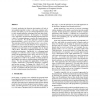Free Online Productivity Tools
i2Speak
i2Symbol
i2OCR
iTex2Img
iWeb2Print
iWeb2Shot
i2Type
iPdf2Split
iPdf2Merge
i2Bopomofo
i2Arabic
i2Style
i2Image
i2PDF
iLatex2Rtf
Sci2ools
123
click to vote
PLDI
1995
ACM
1995
ACM
Corpus-Based Static Branch Prediction
Correctly predicting the direction that branches will take is increasingly important in today’s wide-issue computer architectures. The name program-based branch prediction is given to static branch prediction techniques that base their prediction on a program’s structure. In this paper, we investigate a new approach to program-based branch prediction that uses a body of existing programs to predict the branch behavior in a new program. We call this approach to program-based branch prediction, evidence-based static prediction, or ESP. The main idea of ESP is that the behavior of a corpus of programs can be used to infer the behavior of new programs. In this paper, we use a neural network to map static features associated with each branch to the probabilty that the branch will be taken. ESP shows significant advantages over other prediction mechanisms. Specifically, it is a program-based technique, it is effective across a range of programming languages and programming styles, and...
Branch Prediction | PLDI 1995 | Program-based Branch Prediction | Programming Languages | Static Branch Prediction |
Related Content
| Added | 26 Aug 2010 |
| Updated | 26 Aug 2010 |
| Type | Conference |
| Year | 1995 |
| Where | PLDI |
| Authors | Brad Calder, Dirk Grunwald, Donald C. Lindsay, James H. Martin, Michael Mozer, Benjamin G. Zorn |
Comments (0)

